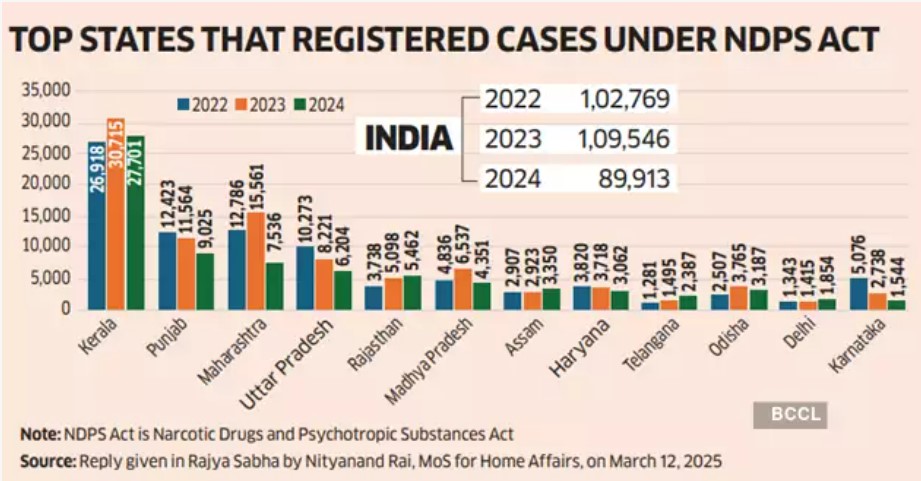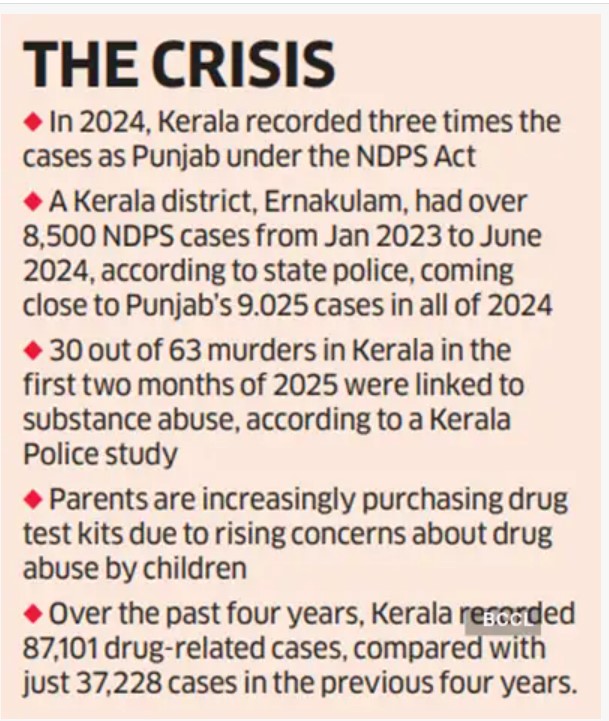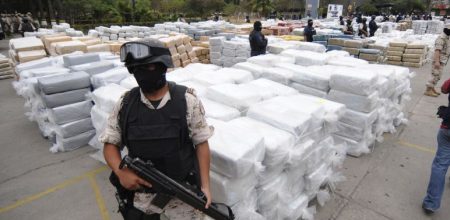Drug Trafficking & Gold Smuggling in Kerala: Why the Cycle Never Ends
Gold smuggling and drug trafficking have become two of the most persistent and disturbing underground industries in India, with Kerala emerging as a major hotspot. While these illegal trades pose severe threats to national security, public health, and the economy, there seems to be a never-ending cycle: carriers get caught, face trial, and then return to the same criminal networks. Why is this happening? Why aren’t our police, excise, and legal systems able to put an end to this menace?
Kerala – A Gateway for Gold and Drugs
With its vast coastline, a large diaspora in the Gulf, and several international airports, Kerala has unfortunately become a prime entry point for smuggled gold and synthetic drugs. In recent years, customs officials have seized kilograms of gold from passengers arriving from Gulf countries, often hidden in shocking ways—sewn into clothes, stuffed in electronic devices, or even carried internally.
At the same time, drugs like MDMA, LSD, ganja, and synthetic opioids are circulating freely in campuses, parties, and urban nightlife, ruining countless young lives. What’s worse is that many of those caught are repeat offenders, and fresh faces—often students or unemployed youth—keep taking their place as carriers.

The Broken System: Why Punishment Doesn’t Work
One would expect that getting caught smuggling gold or drugs would be enough to scare someone straight. But that’s not what’s happening.
1. Weak Bail and Trial Process
Most smugglers and drug peddlers are released on bail within days or weeks of arrest. With backlogged courts and under-staffed prosecutors, cases take years to conclude. During this time, the accused often goes back to the same criminal network.
2. Low Conviction Rate
India has an abysmally low conviction rate in drug and smuggling cases. By the time evidence is processed, witnesses turn hostile or disappear, and the case collapses. The result? Accused walk free, emboldened by the failure of the system.
3. Inadequate Post-Arrest Monitoring
There is no consistent tracking system or rehabilitation framework. Once released, the accused usually finds their way back to crime, as there are no alternative livelihoods or deterrents.
4. Loopholes in the Law
Though the NDPS Act and the Customs Act provide serious punishments on paper, loopholes allow those caught with “non-commercial quantities” to escape with light sentences. In gold smuggling, unless COFEPOSA (which allows preventive detention) is invoked, the accused can get bail and continue operations.
The Rise of Quotation Gangs and Gunda Culture in Kerala
Another serious menace affecting Kerala is the alarming rise of quotation gangs and gunda culture. These gangs operate like contract killers—engaged in land grabs, threats, extortion, and even cold-blooded murders. Many of them are under the influence of drugs and are deeply entrenched in political patronage. Shockingly, several political parties and some leaders in Kerala are known to protect and support their own set of gundas, who are used to intimidate rivals or even silence dissent.
There have been instances of quotation gangs attacking police officers, fueled by synthetic drugs that make them violent and uncontrollable. This has put the law enforcement machinery in a tight spot. Many honest officers are demoralized, knowing that these criminals have political backing and nothing to lose. Also, police personnel are human beings with families—they live in fear of retaliation against their loved ones by drug-crazed thugs with no fear of consequence. This toxic triangle of drugs, politics, and muscle power is destroying the very foundation of law and order in Kerala.
Why Are Newcomers Still Joining This Racket?
- Unemployment and quick money traps.
- Glorification of smuggling in movies and songs.
- Peer pressure, especially among students.
- Weak legal consequences that make crime seem “worth the risk”.
Why Isn’t the System Working?

While there are honest officers and departments trying to crack down, systemic problems are choking the efforts:
- Lack of manpower and modern tools.
- Political interference in investigations.
- Poor coordination between customs, NCB, police, and excise.
- Corruption and fear among officers when dealing with politically backed criminals.
What Can Be Done?
1. Enact Stronger Laws
- Make second-time offenses non-bailable with mandatory minimum sentences.
- Apply COFEPOSA more widely in smuggling cases.
- Treat drug peddling as organized crime, not individual cases.
2. Set Up Fast-Track Courts
- Smuggling and drug trafficking cases should go through special courts with verdicts in under 6 months.
3. Monitor Released Offenders
- Create a national tracking system for offenders with geo-tagged bail conditions and regular police check-ins.
4. Break Political-Criminal Nexus
- Enforce laws that disqualify political leaders who openly support or shield criminals.
- Launch an independent body to audit criminal-political links in every district.
5. Education & Awareness
- Include drug awareness and anti-smuggling modules in school and college curriculums.
- Use social media and influencers to counter glamorization of crime.
Conclusion
Kerala, and India as a whole, is facing a serious internal threat—not from an outside enemy, but from within our own communities. Gold smugglers, drug peddlers, and politically protected gundas are slowly eroding public trust in the law. If we don’t act now with bold policy, fearless enforcement, and systemic overhaul, the future generations will pay the price.
The time has come to name, shame, punish, and reform—not just the criminals, but the very system that protects them.



